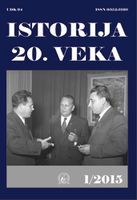Jugoslovensko-švedski odnosi 1941–1945.
The Yugoslav-Swedish Relations 1941–1945
Author(s): Goran LatinovićSubject(s): History
Published by: Institut za savremenu istoriju, Beograd
Summary/Abstract: Despite the occupation and destruction of Yugoslavia in April 1941, the Yugoslav Legation in Stockholm, which had been opened in 1936, continued its activities as one of the diplomatic missions of the Yugoslav Government in exile. However, Yugoslav-Swedish relations during the Second World War were much less intense than in a pre-war period. Although Sweden did not officially recognize the Independent State of Croatia, they were maintaining mutual economic relations. The influx of Yugoslav refugees of pro-communist orientation to Sweden gradually led to their hostility with the Yugoslav Legation. Thus, the tragic civilian conflict, which was fiercely continuing in Yugoslavia, also transmitted to Sweden, although in a much less harmful way. There was another echo of the Yugoslav tragic events in Northern Europe. Of 4.268 men from Yugoslavia, mostly Serbs, who Nazis interned on forced labour in Norway, 2.396 of them lost their lives in German camps, while Sweden hosted 120 Yugoslav refugees. Advantageous relations of the Association „Free Yugoslavia“ and Swedish left-wing parties laid the foundations of Yugoslav-Swedish relations after 1945.
Journal: Istorija 20. veka
- Issue Year: 2015
- Issue No: 1
- Page Range: 45-60
- Page Count: 16

